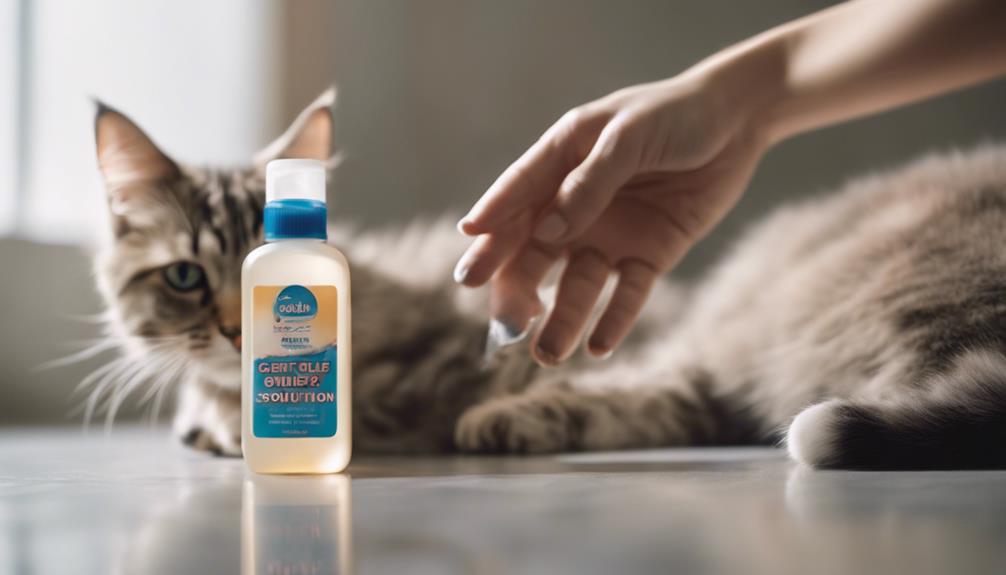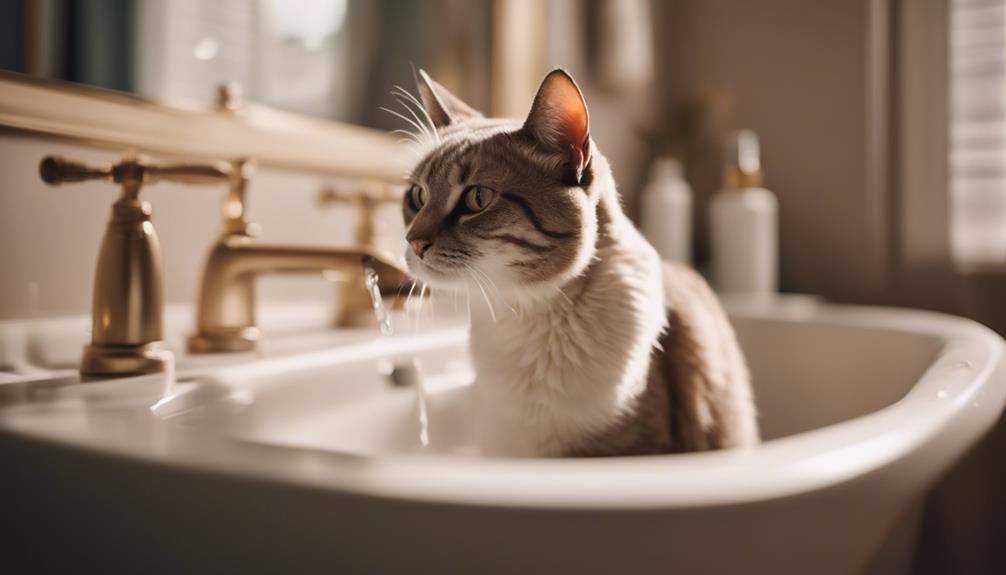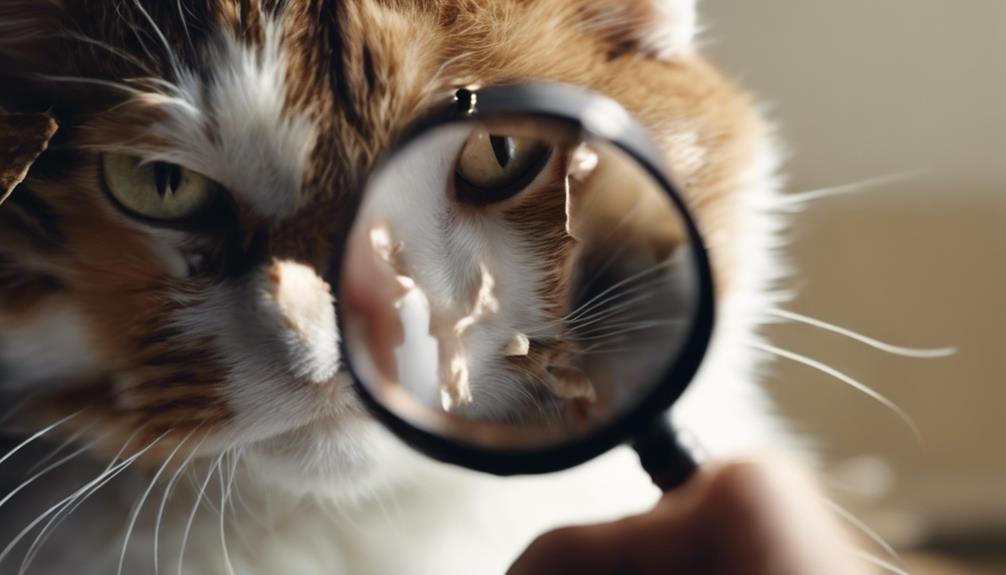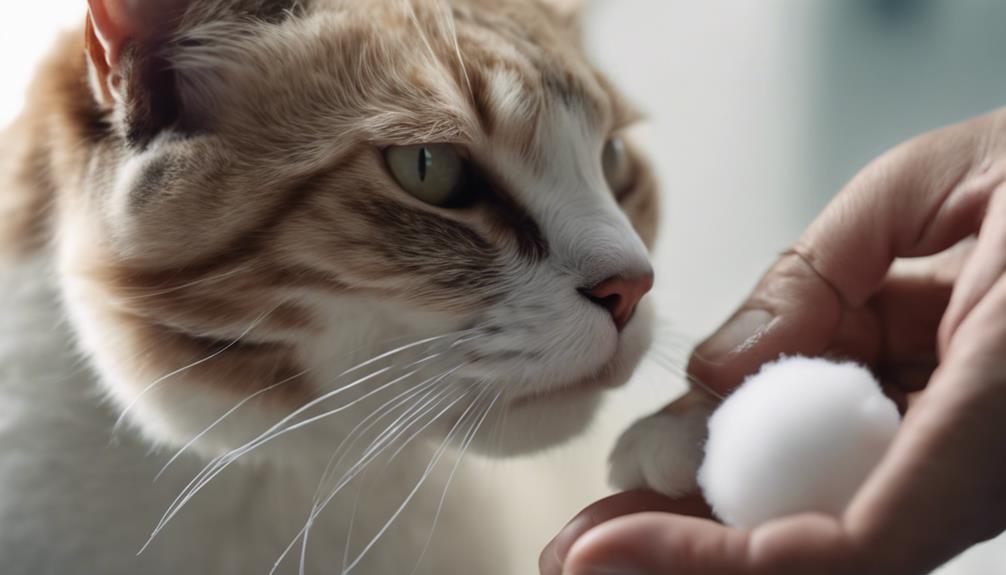Proper ear hygiene is crucial for ensuring the well-being of your feline companion. When your cat's ears start to accumulate gunk, it is vital to address the issue promptly to prevent potential complications.
Knowing the correct methods to clean your cat's ears safely and effectively can make a significant difference in their comfort and health. Stay tuned to discover the essential steps and techniques involved in maintaining your cat's ear hygiene, allowing you to provide the best care possible for your furry friend.
Key Takeaways
- Use feline-specific ear cleaner for safe cleaning.
- Check for signs like redness, swelling, or bad smells.
- Clean ears as needed to maintain health.
- Seek vet help for persistent issues or discomfort.
Importance of Ear Hygiene
Ensuring proper ear hygiene for your cat is essential for maintaining their overall health and well-being. Clean ears can enhance your feline companion's comfort and reduce the risk of infections.
Regular ear cleaning is particularly important for cats with allergies or chronic ear issues. By keeping your cat's ears clean, you can prevent the buildup of wax and debris that may lead to discomfort or more serious problems.
Using a feline-specific cleansing solution and following a gentle cleaning routine can help promote good ear health in your cat. Remember, a healthy cat with clean ears is a happier cat, so make ear hygiene a part of your routine pet care.
Signs for Vet Consultation
Maintaining your cat's ear hygiene not only promotes their overall well-being but also serves as a crucial indicator of potential health issues that necessitate veterinary consultation. Signs that should prompt a visit to the vet include frequent ear scratching, head shaking, redness, swelling, discharge, large wax amounts, or unpleasant odors emanating from the ears.
These symptoms may suggest underlying problems such as infections, ear mites, or allergies that require professional evaluation and treatment. Additionally, if your cat displays signs of discomfort or if there are persistent issues during the ear cleaning process, seeking veterinary help is essential to address any potential concerns promptly.
Regular monitoring and prompt action can help ensure your cat's ear health and overall wellness.
Choosing Safe Cleaning Products

Selecting appropriate ear cleaning products for your feline companion is imperative for maintaining optimal ear health. When choosing safe cleaning products for your cat's ears, consider the following:
- Feline-Specific Cleansing Solution: Opt for a cleaning solution specifically designed for feline ears to ensure it is gentle and safe for your cat.
- Avoid Harmful Substances: Steer clear of products containing harmful ingredients like hydrogen peroxide which can irritate your cat's delicate ears.
- Consult Your Vet: Seek advice from your veterinarian on the best ear cleaner for your cat's specific needs and inquire about natural remedies for ear care.
Fear-Free Preparation Tips
To create a calm environment for cleaning your cat's ears, consider administering fear-free medication and utilizing Feliway to help keep your feline companion relaxed during the process.
Fear-free medication, prescribed by a veterinarian, can help alleviate anxiety in your cat, making the ear cleaning experience less stressful for both of you.
Feliway, a synthetic pheromone diffuser, can further aid in reducing your cat's stress levels by creating a calming atmosphere.
Setting Up the Cleaning Environment

Creating a tranquil atmosphere is essential when preparing to clean your cat's ears. To set up the cleaning environment effectively:
- Choose a Quiet Room:
- Find a peaceful space with minimal distractions to help keep your cat calm.
- Dim the lighting to create a soothing ambiance that promotes relaxation.
- Gather Necessary Supplies:
- Ensure you have all the required cleaning products and tools within easy reach.
- Have a comfortable area prepared for your cat to sit during the cleaning process.
- Use Fear-Free Aids:
- Consider using fear-free medication or pheromone diffusers like Feliway to help reduce your cat's anxiety.
- These aids can contribute to a more pleasant experience for both you and your feline companion.
Proper Application Technique
Ensuring precise application of the feline-specific ear cleaning solution is crucial for maintaining your cat's aural health. Proper technique can help prevent ear infections and discomfort. To apply the solution effectively, follow these steps:
| Step | Instructions | Tips |
|---|---|---|
| Prepare the Solution | Shake the bottle well before use. Pour a small amount onto a clean cotton pad. | Warm the solution slightly for comfort. |
| Approach Your Cat | Gently hold your cat and speak softly to keep them calm. Lift the ear flap and expose the ear canal. | Use treats or toys to distract your cat. |
| Apply the Solution | Wipe the cotton pad along the inside and outside of the ear, avoiding the ear canal's inner depths. | Use a gentle, circular motion for cleaning. |
Frequency of Ear Checks

Regularly monitoring and inspecting your cat's ears is essential for maintaining their overall ear health and well-being. It is crucial to check your cat's ears frequently to catch any issues early on. Here are some key points to consider when determining the frequency of ear checks:
- As needed: Clean your cat's ears whenever you notice a light pink color and minimal wax buildup to prevent any potential problems.
- Brown debris: If you see brown debris, it may indicate excess wax or underlying issues like ear mites that require attention.
- Warning signs: Pay close attention to foul smells, redness, or sores in your cat's ears, as these are indicators that veterinary care is necessary.
Identifying Warning Signs
To ensure the well-being of your feline companion, it is imperative to promptly recognize warning signs of potential ear issues during routine checks. Signs that may indicate problems with your cat's ears include:
- frequent scratching or pawing at the ears
- head shaking
- redness or swelling of the ear canal
- unusual discharge such as pus or blood
- a build-up of wax that appears dark or abnormal in texture
- unpleasant odors emanating from the ears
Additionally, if you notice your cat tilting their head to one side, sensitivity when the ears are touched, or any signs of discomfort during ear cleaning, it is crucial to seek veterinary attention promptly. Early detection of these warning signs can help prevent further complications and ensure your cat's ear health is properly addressed.
When to Seek Professional Help

Seeking professional veterinary help is crucial if your cat exhibits persistent signs of discomfort or abnormal ear issues despite home care efforts. When considering when to seek professional help for your cat's ear problems, keep the following points in mind:
- Persistent Symptoms: If your cat continues to show signs of discomfort such as frequent ear scratching, head shaking, or redness, it's time to consult a veterinarian.
- Unusual Discharge: Any abnormal discharge, swelling, or foul smells coming from your cat's ears could indicate an underlying issue that requires professional attention.
- Lack of Improvement: If the ear problems do not improve or worsen after attempting home cleaning methods, it is best to seek veterinary help promptly to prevent further complications.
Conclusion
In conclusion, maintaining your cat's ear hygiene is like tending to a delicate garden – with care and attention, you can prevent weeds from taking root and ensure a flourishing environment.
By following the proper techniques and using safe products, you can remove gunky build-up and promote optimal ear health for your feline companion.
Stay vigilant, listen to your cat's needs, and enjoy the harmonious bond that comes with nurturing their well-being.




